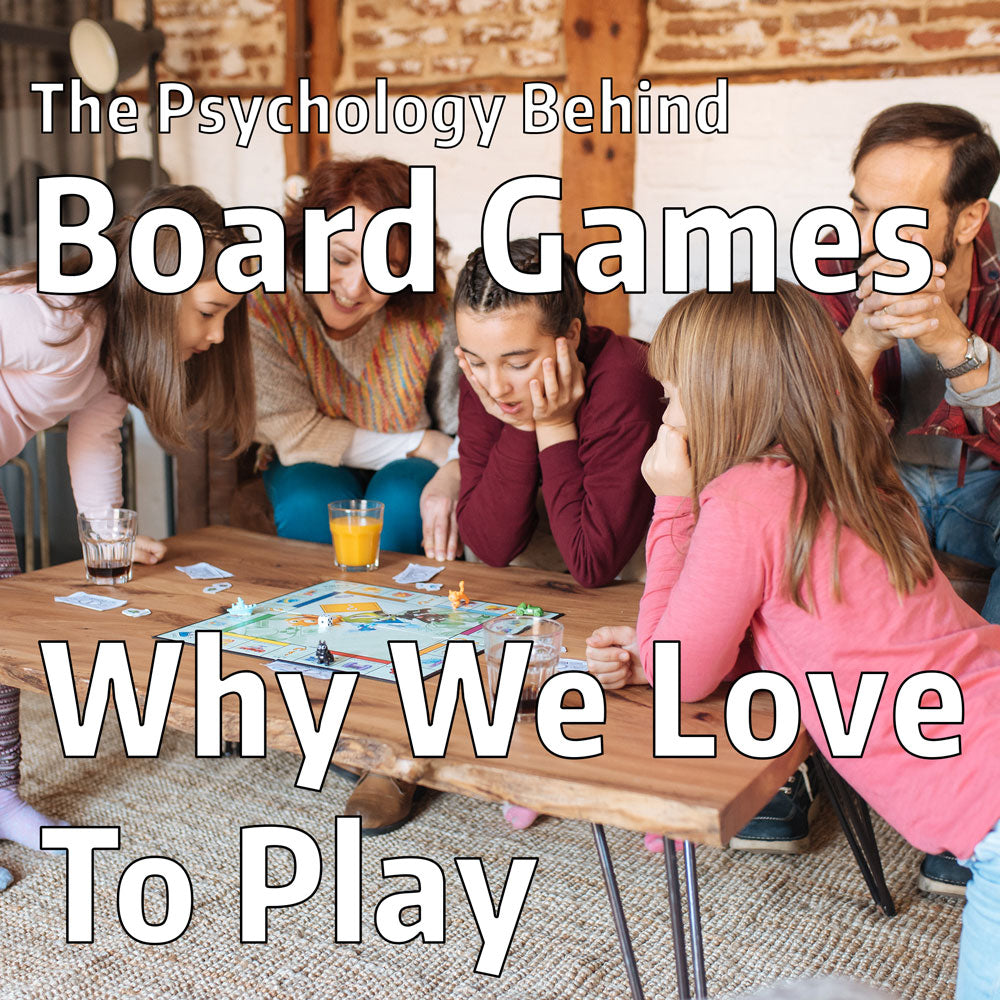Updated December 29, 2024
In recent years, board games have seen a phenomenal resurgence, captivating the hearts of people from all walks of life. Why, you might wonder, has this age-old form of entertainment returned to the limelight?
In this article, we delve into the psychology behind board gaming, exploring the myriad benefits that these games bring to our lives. From stress relief to sharpening our minds, board games aren't just fun—they're a gateway to a healthier, happier you!

The Universal Appeal of Board Games
Board games have a unique charm that transcends age, culture, and background. Whether it's the strategic depths of "Chess", competitiveness of "Spheres of Life" or the brutish fun of "Cards Against Humanity," these games offer something for everyone.
Families gather around "Monopoly" on game nights, friends challenge each other in "Settlers of Catan," and even solo players find joy in games like "Solitaire." The diversity in board games ensures that no matter your interest, there's a game out there for you.
Related: Is the "Spheres of Life" card game for me?
Reasons Why People Love to Play Board Games
Board games have an undeniable charm that captivates people of all ages, but what exactly draws us to this form of entertainment? Let's explore psychology of board games and some key reasons why playing board games is a beloved activity worldwide.
Social Interaction
At their core, board games are a social experience. They bring people together, offering a fun way to interact and bond. In a world where digital communication is predominant, the face-to-face interaction that board games provide is invaluable. Whether it's a family game night or an evening with friends, board games create memorable social experiences.
Escapism
In our fast-paced, often stressful lives, board games provide a much-needed escape. They allow players to immerse themselves in different worlds, from fantasy landscapes to historical settings. This form of escapism is not only entertaining but can also be a healthy way to disconnect from everyday worries.
Challenge and Achievement
People naturally enjoy challenges and the satisfaction that comes with achieving goals. Board games offer a variety of challenges, whether it's outsmarting opponents in a strategy game or solving complex puzzles in a cooperative game. The sense of accomplishment after a well-played game is a significant draw.
Mental Stimulation
Board games keep the mind active and engaged. They require a mixture of strategy, logic, and sometimes a bit of luck. This mental exercise is not only enjoyable but also beneficial for cognitive health, keeping the mind sharp and alert.
Learning Opportunities
Many board games have educational aspects, teaching anything from basic counting and vocabulary to complex strategy and critical thinking skills. They offer a fun way to learn new concepts and skills, making them popular among parents and educators.
Versatility and Variety
The sheer variety of board games available means there's something for everyone. From quick, light-hearted party games to deep, hours-long strategy games, the range is immense. This versatility ensures that no matter your mood or the group you're with, there's a board game that fits the occasion.
Nostalgia and Tradition
For many, board games are a nostalgic part of their childhood. Revisiting these games as adults can bring back fond memories and create new ones with the next generation. Additionally, board games often become family traditions, passed down through generations, making them a cherished part of family history.
Affordable Entertainment
Compared to many forms of entertainment, board games are relatively affordable. Once purchased, a game can be played countless times, offering endless hours of entertainment. This one-time investment for ongoing enjoyment makes board games a popular choice for many.
Social Dynamics and Tabletop Gaming
Board games are more than just playing pieces and dice; they're about the people around the table. "Tabletop gaming" is a social experience, one that strengthens bonds and fosters communication.
Games like "Dixit" or "Codenames" require players to think creatively and understand each other's perspectives, enhancing empathy and social skills. In a world increasingly dominated by screens, board games offer a refreshing opportunity for face-to-face interaction.
Board Games and Mental Health
In the realm of mental health, board games are unsung heroes. Dubbed 'board game therapy,' these games can significantly reduce stress and anxiety. Engaging in a game of "Scrabble" or "Ticket to Ride" takes your mind off worries, providing a much-needed break. Moreover, the cognitive skills required in these games – from memory to problem-solving – can enhance mental agility and delay the onset of age-related cognitive decline.
Related: Ticket to Ride Review
Enhanced Cognitive Functioning Through Board Games
One of the most significant psychological benefits of board gaming is its impact on cognitive skills. Games like "Chess" and "Go" are renowned for their strategic depth, requiring players to think several moves ahead. This kind of forward planning and problem-solving enhances critical thinking skills and improves overall brain function.
Memory-based games like "Memory" or "Clue" bolster recall abilities, helping players of all ages keep their minds sharp. Moreover, the variety of challenges presented in different games means that regular play can continually stimulate and engage various cognitive faculties, contributing to long-term mental health.
For children and young adults, board games are a fun and effective learning tool. Educational games like "Scrabble" improve vocabulary and spelling, while "Terraforming Mars" teaches geography and strategic planning. The collaborative nature of many games also teaches valuable lessons in teamwork and sportsmanship.
Related: Terraforming Mars Review.
Strategic Thinking and Problem Solving
Delving deeper into the psychological benefits, board games are a playground for the mind. Strategy games like "Risk" or "Chess" require foresight, planning, and adaptability. These games challenge players to think critically, make decisions under pressure, and learn from their mistakes – skills that are invaluable in everyday life.
Emotional Intelligence and Empathy in Gaming
Board games also play a crucial role in developing emotional intelligence and empathy. Role-playing games (RPGs), for instance, encourage players to step into the shoes of different characters, fostering a deeper understanding of diverse perspectives.
Cooperative games like "Pandemic" or "Forbidden Island" require players to work together towards a common goal, promoting teamwork and enhancing social bonds.
During gameplay, players experience a range of emotions – from the joy of victory to the gracious acceptance of defeat – which can mirror real-life emotional situations. Handling these emotions within the safe space of a game can improve emotional regulation and resilience in everyday life.
Best Board Games for Various Group Sizes
Now, let's talk about some lesser-known gems in the board gaming world. For small groups, try "Azul," a visually stunning game about tile-laying that's easy to learn but offers deep strategic play.
For larger groups, "7 Wonders" is a fantastic choice, allowing up to seven players to build ancient civilizations through resource management and card drafting. And for those who enjoy a good challenge, "Spirit Island" is a cooperative game where players work together to defend their island from invaders.

Conclusion
And there you have it, folks—the secret sauce behind our love for board games! It's not just about killing time or seeing who can hoard the most Monopoly money. Nope, it's about so much more. Board games are like the Swiss Army knives of fun—they slice through boredom, sharpen our brains, and keep our social skills on point. Think about it: when was the last time you laughed till you cried over a game of charades or outwitted your pals in a game of strategy?
In this world of endless scrolling and tapping on screens, board games throw us a lifeline back to real, laugh-out-loud human connections. They're our trusty sidekicks in battling brain fog and our secret weapon in turning a dull evening into a night to remember. Whether you're the competitive type, a strategy guru, or just in it for the giggles, there's a board game out there with your name on it.
So next time you're pondering how to jazz up your evening, skip the Netflix binge. Dust off that board game, rally the troops (a.k.a., your friends or family), and dive into some good old-fashioned gaming fun. Who knows? You might just rediscover the joys of being a board game fanatic. Roll the dice, spin the wheel, and let the games begin!
Related Articles:
- How Playing Board and Card Games can be good for your well-being
- 30+ Best Card Games to Play with Friends or at a Gathering
- Best Bang for Buck: Top Value-For-Money Board & Card Games
Looking for a new card game to play with your friends?
The Spheres of Life: Mythical Forest is a new completive fantasy card game for 2-7 Players. From stunning design to fun gameplay, this exciting game can be a fantastic addition to your family and friends' game nights!


